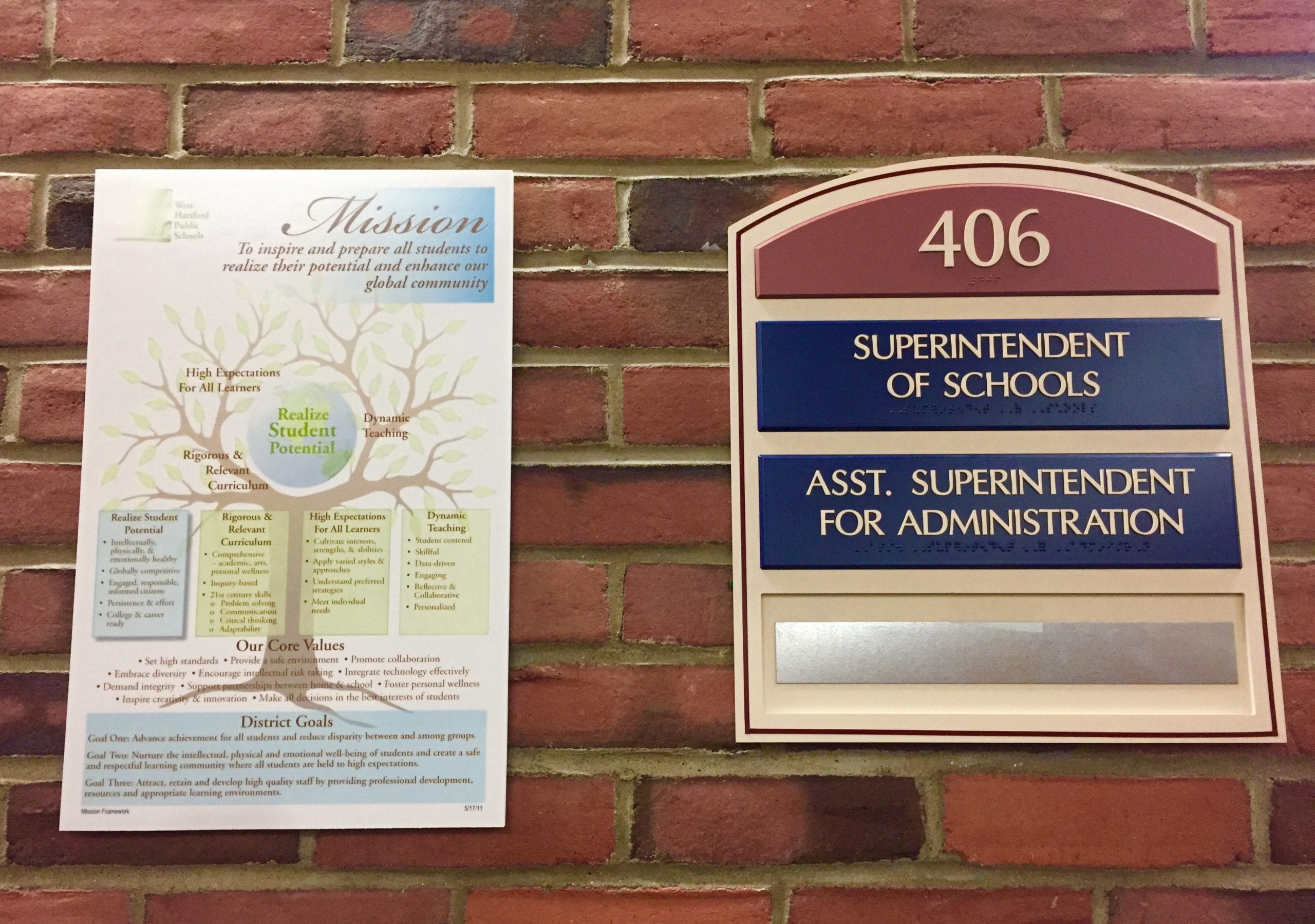Shortfall in State Special Education Cost Reimbursement Creates Major Hole in West Hartford Board of Education Budget

Audio By Carbonatix

West Hartford Public Schools Superintendent's Office. Photo credit: Ronni Newton (we-ha.com file photo)
The West Hartford Board of Education received a financial report at Tuesday night’s meeting.
By Manon L. Mirabelli
West Hartford Public Schools officials painted a grim financial picture as the district grapples with a $1 million overall deficit in the Board of Education’s general fund budget resulting from the cost of key services such as out-of-district transportation and tuition.
Superintendent of Schools Paul Vicinus said he, Town Manager Rick Ledwith, and Mayor Shari Cantor had met with the town’s legislative delegation to discuss the serious shortfall in reimbursement from the state. He and Board members urged the public to also express their concerns to legislators.
In a presentation to Board of Education members on Feb. 4, Elizabeth Hewitt, director of finance and planning for West Hartford Public Schools, said the general fund will have a $1 million shortfall at the end of the fiscal year on June 30 due to the reduction of a cost reimbursement grant.
“In order to close the year within budget, the district will need additional state funding, a supplemental appropriation from the town, or additional expenditure reductions,” she said.
Ethan Goldman, one of the Board’s two financial examiners, provided the year-to-date update. While the overall cost of salaries is showing a surplus of $250,000 and benefits are expected to fall within projected levels, and a savings of $325,000 will occur for utility services – purchased services will result in a deficit of more than $1.2 million. A savings of $100,000 under that line item is overshadowed by losses of $300,000 in out-of-district transportation costs and $1.7 million in out-of-district tuition for students receiving special education services.
“In total, the district is receiving $3,757,000 less in excess cost reimbursement than it is entitled to due to the capped state appropriation,” Hewitt said. “The district plans to use $350,000 from the special programs fund to mitigate the financial impact, leaving a shortfall of $1.4 million in the general fund.” With savings in other areas, the overall shortage is $1 million, but the budget must be balanced.
Under the category of grant funds, awards and carry-forward authorizations for fiscal year 2024-2025 total $6,677,019 as of Dec. 31, 2024.
“It is anticipated that all single-year grants will be fully expended by June 30,” Hewitt said. “Numerous multi-year grants may have small balances to carry forward to the next school year to be expended in accordance with the terms of the grant award.
Vicinus said Gov. Ned Lamont vowed an extra $40 million in funding to support special education, but that would not be until the 2027 fiscal year.
“There’s a very genuine effort afoot in the legislature to try to support the educational cost sharing, which will provide money to the town, not necessarily to the district direct,” but it’s pretty much earmarked, Vicinus said Tuesday. “We’re optimistic there will be some change there.”
But there is also a real need for more to be done regarding the current need, which impacts districts across the state that are in the same predicament, Vicinus said.
The state has been flat-funding the excess cost reimbursement – a tiered formula that provides reimbursement to districts which are required to provide special education services, even if they cannot be accommodated in-house. Currently, the formula reimburses the cost in excess of 4.5 times the district’s average per pupil expenditure, but as the costs of tuition and transportation increase, the pool of money , which has been $181 million, only goes so far, resulting in a decreased reimbursement percentage to districts.
In their discussion with the legislative delegation, Vicinus said that he, Ledwith, and Cantor clearly expressed the pressure the district is facing, and the need for “some state reaction” to the problem.
“The delegation understood, but how it applies across the state is being talked about in all communities,” Vicinus said. “I really hope to see if some change can happen to adjust flat funding.”
He noted that there is an opportunity for public testimony for superintendents to address the legislature – which he plans to do – and urged the public to also speak out.
Board Chair Lorna Thomas-Farquharson commented that “we’ve been bracing ourselves for some time,” and urged the public to “squeak the wheel.”
“What we’ve known has been coming is we are quickly approaching nearly 4 million dollars of where we should be funded by the state for excess costs,” said Board member Jason Gagnon, with Hewitt confirming that the number is roughly $3.8 million.
“The federal government is continuing to fund education,” Gagnon said. But the state – which had originally committed to funding 85% of excess costs for special education – “needs to step up.” In the previous fiscal year, the reimbursement was cut to 66.7% because of a shortage in the overall fund. This year the percentage reimbursement is just 62.1%, leading to the significant shortfall.
Hewitt said because West Hartford Public Schools was in the middle level of three tiers – rather than the lowest tier – for reimbursement in the current fiscal year, she “thought we were still being conservative budgeting in the high 60s but unfortunately with the drop to 62.1% we find ourselves in this situation.”
At current trajectory, Hewitt added, the district will have to budget for reimbursement somewhere in the range of 58% and that will have some significant impact on the overall budget going forward. Vicinus will present his proposed budget to the Board next month.
“This is a call to action for every resident of West Hartford, every citizen across the state of Connecticut to say basically the budget surplus we think we have – I don’t know how you have a budget surplus if you’re not fully funding education,” Gagnon said, referencing the state’s reported budget surplus that has been added to reserves and used to pay down the pension fund deficit. Gagnon said the town’s delegation is working hard, but the more voices the better “because this is unsustainable.”
On Wednesday, Feb. 5, Connecticut Education Association President Kate Dias released a statement in response to the governor’s budget address saying that despite “some encouraging news,” Lamont’s proposal “falls short of the bold, immediate action needed to address the urgent crises of special education funding and the teacher shortage in our state.”
Dias also addressed the governor’s plan to cap out-of-district costs to private providers, which would result in a $14 million incentive grant to provide “high-quality in-district special education programs” as “welcome and much needed additions” but are ones for which students cannot wait.
“They need action now.”
Like what you see here? Click here to subscribe to We-Ha’s newsletter so you’ll always be in the know about what’s happening in West Hartford! Click the blue button below to become a supporter of We-Ha.com and our efforts to continue producing quality journalism.




West Hartford should develop in-district special education services, which would be consistent with educating students in the least restrictive environment and IDEA. In the long run, those services would be cheaper than sending students out-of-district. Towns and the state should work together and share funds to make this a reality.